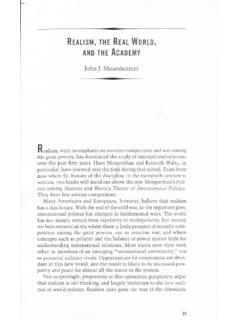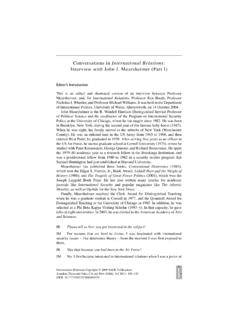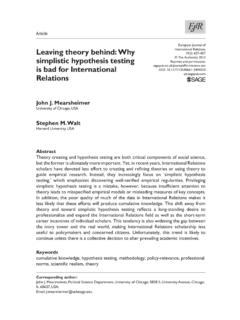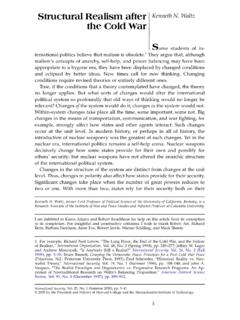Transcription of 05-IRT-Chap04.qxd 31/07/06 03:03 PM Page 71 4 Structural ...
1 4 Chapter contents Introduction Why do states want power? How much power is enough? What causes great power war? ConclusionReader s guideThis chapter examines a body of realist theories that argue states care deeply aboutthe balance of power and compete among themselves either to gain power at theexpense of others or at least to make sure they do not lose power. They do so becausethe structure of the international system leaves them little choice if they want tosurvive. This competition for power makes for a dangerous world where states some-times fight each other.
2 There are, however, important differences among structuralrealists. In particular, defensive realists argue that Structural factors limit how muchpower states can gain, which works to ameliorate security competition. Offensiverealists, on the other hand, maintain that the system s structure encourages states tomaximize their share of world power, to include pursuing hegemony, which tends tointensify security competition. The subsequent analysis revolves around four do states want power? How much power do they want?
3 What causes war? CanChina rise peacefully (the thematic of the case study)?. Structural RealismJOHN J. 31/07/06 03:03 PM Page 7172 JOHN J. MEARSHEIMERI ntroductionRealists believe that power is the currency of international politics. Great powers, the mainactors in the realists account, pay careful attention to how much economic and militarypower they have relative to each other. It is important not only to have a substantialamount of power, but also to make sure that no other state sharply shifts the balance ofpower in its favour.
4 For realists, international politics is synonymous with power are, however, substantial differences among realists. The most basic divide isreflected in the answer to the simple but important question: why do states want power?For classical realists like Hans Morgenthau (1948a), the answer is human nature. Virtuallyeveryone is born with a will to power hardwired into them, which effectively means thatgreat powers are led by individuals who are bent on having their state dominate its can be done to alter that drive to be all-powerful.
5 A more detailed treatment ofclassical realism can be found in Chapter Structural realists, human nature has little to do with why states want , it is the structure or architecture of the international system that forces states topursue power. In a system where there is no higher authority that sits above the greatpowers, and where there is no guarantee that one will not attack another, it makeseminently good sense for each state to be powerful enough to protect itself in the event itis attacked.
6 In essence, great powers are trapped in an iron cage where they have littlechoice but to compete with each other for power if they hope to realist theories ignore cultural differences among states as well as differencesin regime type, mainly because the international system creates the same basic incentivesfor all great powers. Whether a state is democratic or autocratic matters relatively littlefor how it acts towards other states. Nor does it matter much who is in charge of conduct-ing a state s foreign policy.
7 Structural realists treat states as if they were black boxes:they are assumed to be alike, save for the fact that some states are more or less powerfulthan is a significant divide between Structural realists, which is reflected in the answerto a second question that concerns realists: how much power is enough? Defensive realistslike Kenneth Waltz (1979) maintain that it is unwise for states to try to maximize theirshare of world power, because the system will punish them if they attempt to gain toomuch power.
8 The pursuit of hegemony, they argue, is especially John Mearsheimer (2001) take the opposite view; they maintain that it makesgood strategic sense for states to gain as much power as possible and, if the circumstancesare right, to pursue hegemony. The argument is not that conquest or domination is goodin itself, but instead that having overwhelming power is the best way to ensure one s ownsurvival. For classical realists, power is an end in itself; for Structural realists, power is ameans to an end and the ultimate end is is based on the material capabilities that a state controls.
9 The balance of power ismainly a function of the tangible military assets that states possess, such as armoureddivisions and nuclear weapons. However, states have a second kind of power, latent power,which refers to the socio-economic ingredients that go into building military power is based on a state s wealth and the size of its overall population. 31/07/06 03:03 PM Page 72powers need money, technology, and personnel to build military forces and to fight wars,and a state s latent power refers to the raw potential it can draw on when competing withrival states.
10 It should be clear from this discussion that war is not the only way that statescan gain power. They can also do so by increasing the size of their population and theirshare of global wealth, as China has done over the past few us now consider in greater detail the Structural realists explanation for why statespursue power, and then explore why defensive and offensive realists differ about howmuch power states want. The focus will then shift to examining different Structural realistexplanations about the causes of great power war.




